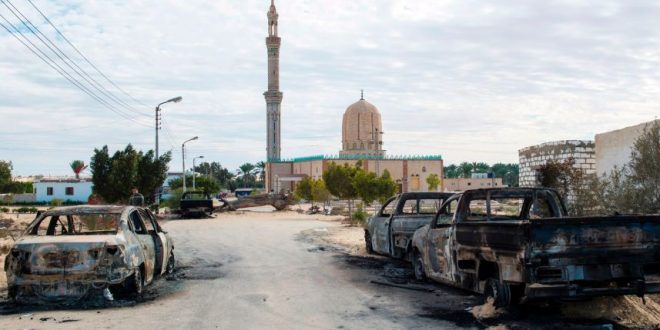President Sisi pledges extreme force in revenge for Egypt’s worst atrocity
Egypt was reeling on Saturday from the worst atrocity it has suffered in recent years, with officials putting the death toll from the bomb and gun assault on a Sinai mosque at 305. The figure includes 27 children.
A further 128 people were wounded in the attack on the Rawdah mosque in Bir al-Abed, north Sinai. A bomb ripped through the mosque as Friday prayers were finishing, before militants opened fire on worshippers. In response, airstrikes were directed at “terrorist” locations, said military sources.
Egypt’s chief prosecutor, Nabil Sadeq, said the attack was carried out by 25-30 militants who had stationed themselves at the mosque’s main door and 12 windows before opening fire on those inside. More than 50 ambulances ferried casualties from the mosque, about 25 miles west of the city of Arish, to nearby hospitals. Pictures from the scene showed rows of bloodied victims inside the mosque.
Theresa May yesterday told the Egyptian president, Abdel Fattah al-Sisi, that the UK “stands ready to help in any way possible”. Downing Street added that the two leaders agreed that international co-operation was needed to tackle the problem of terrorism.
No group has claimed responsibility for the attack, but it marks a significant escalation in a region where, for the past three years, Egyptian security forces have battled an Islamic State insurgency that has killed hundreds of police and soldiers. It was reported yesterday that the assailants were carrying the Islamic State flag. The attack was not only one of the worst terrorist incidents in Egyptian history, but also the first on a mosque. The justification for assaulting a Muslim place of worship appears to be that the mosque was frequented by Sufis, a sect considered by many Islamist extremists to be heretical.
There are, however, many conspiracy theories circulating, which suggest the atrocity has provided the president with a convenient opportunity to demonstrate his security credentials. In a nearby outdoor cafe, in the shadow of another mosque frequented by Sufis, Sayeda Zeinab, most patrons were adamant on Saturday that the attack was purely politically motivated. “This was all because of the elections,” said one customer.
Sisi is widely expected to stand in elections due to be held early next year to try to retain the presidency. When he first ran in 2014, the message of his campaign was that the former army general was the only man who could bring stability to the country and prevent the chaos that has engulfed neighbouring Libya and Syria from ever reaching Egypt.
“I supported him,” said the customer. “But I would never vote for him again. I’ll take just about anyone else; he can’t win.” With a sharp drop in tourism, following the 2011 Arab Spring, Sisi has presided over a period of economic instability, in addition to one with a sustained terrorist threat. “Do any of us live as well as we used to?” said the customer. “My salary is a third of what it used to be.”
All around the cafe and in the street are signs of the upcoming elections. Posters draped from the lamp-posts show Sisi’s smiling face, accompanied with an appeal for him to “Build it” – meaning to re-run for office. This is supposedly a grassroots movement, although some community figures have reported being given petitions to hand out, sent to them by the interior ministry.
With the elections drawing closer, this attack seems to have shaken the nerves of the government. The president has reacted swiftly, promising to meet the attack with extreme force, as well as declaring three days of public mourning. In a press release on Saturday, the state information services said he had ordered that 200,000 Egyptian pounds (£8,478) be paid to the families of victims for every member killed. Within hours of the attack, security forces also reported airstrikes in the vicinity of the attack.
Yet the mood in Cairo is one of calm. The number of people killed and injured in the Sinai attack is much higher than in past terrorist atrocities. However, north Sinai remains a no-go area for journalists, making it difficult to confirm details.
Cairo’s residents are used to stories of violence from the Sinai region. “It feels like a long way away,” says Ahmed Yousef, 30, a telecoms engineer. “They can’t even get into Cairo, it’s too crowded.”
In July, at least 23 soldiers were killed when suicide car bombs were detonated at two military checkpoints in the Sinai. Isis claimed responsibility. The local Isis affiliate, Wilayat al-Sinai (the governorate of Sinai), also carried out the previous deadliest attack in the region when, in 2015, it brought down a Russian passenger jet that was carrying tourists back from the resort of Sharm el-Sheikh, killing 224 people.
The Guardian
 Lebanese Ministry of Information
Lebanese Ministry of Information



